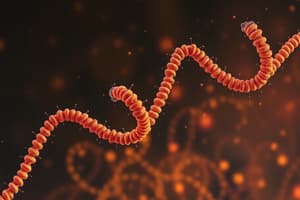Podcast
Questions and Answers
What does tRNA stand for?
What does tRNA stand for?
- transcript RNA
- transfer RNA (correct)
- transitional RNA
- transport RNA
What is the primary function of a ribosome?
What is the primary function of a ribosome?
the site of protein synthesis
What is an anticodon?
What is an anticodon?
group of three bases on a tRNA molecule that are complementary to the three bases of a codon of mRNA
What is a codon?
What is a codon?
What is a polypeptide chain?
What is a polypeptide chain?
What is a peptide bond?
What is a peptide bond?
What are amino acids?
What are amino acids?
Flashcards are hidden until you start studying
Study Notes
tRNA
- Stands for transfer RNA, crucial in the process of protein synthesis.
- Carries specific amino acids to ribosomes, where proteins are assembled.
- Has an anticodon region that pairs with the codon on mRNA to ensure correct amino acid delivery.
Ribosome
- A cell organelle made up of ribosomal RNA (rRNA) and proteins.
- Functions as the site for protein synthesis, translating mRNA sequences into polypeptide chains.
- Exists in two subunits, large and small, that come together during protein synthesis.
Anticodon
- Consists of three nucleotide bases found on a tRNA molecule.
- Complementary to the mRNA codon, allowing precise pairing during translation.
- Plays a critical role in ensuring that the correct amino acid is added to the growing polypeptide chain.
Codon
- A sequence of three nucleotide bases on mRNA that specifies a particular amino acid.
- Each codon corresponds to one amino acid, essential for the accurate translation of genetic information.
- There are 64 possible codons that code for 20 different amino acids.
Polypeptide Chain
- Comprised of a sequence of amino acids linked together by peptide bonds.
- These chains fold into specific three-dimensional shapes, forming functional proteins.
- The length and composition of a polypeptide chain determine the structure and role of the protein.
Peptide Bond
- A covalent bond formed between the amino group of one amino acid and the carboxyl group of another.
- Responsible for linking amino acids together to form polypeptides and proteins.
- The formation of peptide bonds occurs during the process of translation within ribosomes.
Amino Acid
- The fundamental building blocks of proteins, each possessing an amino group, a carboxyl group, and a unique side chain.
- There are 20 different amino acids that combine in various sequences to create a vast array of proteins.
- Essential for numerous biological processes, including metabolism, cell signaling, and structural functions.
Studying That Suits You
Use AI to generate personalized quizzes and flashcards to suit your learning preferences.


